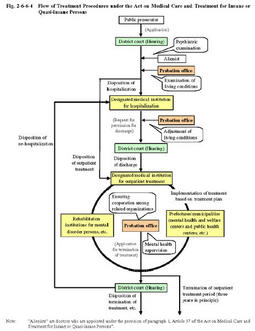| Previous Next Index Image Index Year Selection | |
|
|
4 Act on Medical Care and Treatment for Insane or Quasi-insane Persons Who Have Caused Serious Injury to Others On July15,2005,the Act on Medical Care and Treatment for Insane or Quasi-insane Persons Who Have Caused Serious Case(Law No.110of2003;hereinafter referred to as the"Act on Medical Care and Treatment for Insane or Quasi-insane Persons")entered into force.The purpose of this Law is to provide proper and continuous medical treatment and to implement observation and guidance necessary to secure medical treatment,with the aim of improving their disease,preventing their recommitment of similar serious offenses,and of promoting their social rehabilitation.
Fig.2-6-6-4 shows the flow of treatment procedures under the Act on Medical Care and Treatment for Insane or Quasi-insane Persons. Fig.2-6-6-4 Flow of Treatment Procedures under the Act on Medical Care and Treatment for Insane or Quasi-insane Persons Under this Law,when a person who has committed a serious offense such as homicide,arson,robbery,rape/indecent assault(including attempt),and injury is not prosecuted on the ground of being insane or quasi-insane,or found,by final and conclusive judgments,not guilty on the ground of being insane or given a mitigated sentence on the ground of being quasi-insane(excluding the case of sentence without suspension),a collegiate court body in a district court consisting of a judge and a mental health examiner(psychiatrist)shall,on application of a public prosecutor,hold a hearing with regard to the necessity of medical treatment and the details of such treatment.Discharge from the hospital and termination of treatment is also decided by a collegiate court body with the same composition.(1) Medical care by hospitalization A person who is given a disposition of hospitalization(disposition to hospitalize the person for medical treatment)shall be hospitalized in a designated medical institution for hospitalization and receive detailed and specialized treatment by the government.During the period of hospitalization,probation offices shall make arrangements for the person's living conditions after discharge from the hospital.
(2) Treatment in local communities and rehabilitation coordinators A person who is given a disposition of outpatient treatment(disposition to have the person receive outpatient treatment)or is allowed discharge from the hospital shall,for three years in principle(for five years at maximum),go to a designated medical institution for outpatient treatment to receive outpatient treatment and be subject to mental health supervision by probation offices.Mental health supervision aims to ensure on-going medical care for persons in question by supervising their hospital visits and living conditions through direct interviews and reports from related organizations,and giving them necessary guidance.
In addition to on-going medical care,other supports such as necessary mental health and welfare services are important so that persons in question can live a stable life in local communities.Therefore,support is provided by prefectures and municipalities(mental health and welfare centers,and public health centers,etc.)and rehabilitation institutions for mental disorder persons are available for the mental disorder persons who live in local communities. For treatment in local communities,medical care,mental health supervision,and support need to be provided in a proper and smooth manner as the major three pillars.For that purpose,probation offices consult with designated medical institutions for outpatient treatment,prefectures,and municipalities to make treatment plans,and try to standardize treatment policies and clarify the division of roles.Probation offices,designated medical institutions for outpatient treatment,and related organizations of prefectures and municipalities implement treatment based on these plans.For proper and smooth implementation of treatment based on the plans,probation offices develop cooperative relationships among related organizations and try to ensure close mutual cooperation by holding meetings with related organizations. Rehabilitation coordinators are newly assigned to probation offices for these tasks. Explanation of term Mental health examiner A doctor to form a collegiate court body with a judge in hearings.One doctor is assigned for each applied case from those selected by district courts every year in advance from doctors(mental health diagnosticians)registered in the list that is submitted to the Supreme Court by the Minister of Health,Labor and Welfare every year.In consultation with a judge,a mental health examiner is supposed to offer an opinion based on his academic experience in medical care for mental disorder persons. Designated medical institution for hospitalization/outpatient treatment An institution designated by the Minister of Health,Labor and Welfare to provide medical care in treatment under the Act on Medical Care and Treatment for Insane or Quasi-insane Persons.Designated medical institutions for hospitalization are hospitals established by the government,prefectures,or specified(local)independent administrative agency,and are designated,selecting from hospitals that meet criteria stipulated by the Ordinance of the Ministry of Health,Labor and Welfare.Designated medical institutions for outpatient treatment are designated,selecting from hospitals and clinics that meet criteria stipulated by the Ordinance of the Ministry of Health,Labor and Welfare. Rehabilitation coordinators Rehabilitation coordinators engaged in mental health supervision at probation offices are supposed to be psychiatric social workers,health nurses,nurses,occupational therapists,or certified social workers who have experience in support work for mental disorder persons or who are recognized to have expertise of the same or superior level as those mentioned above by the Minister of Justice. |
